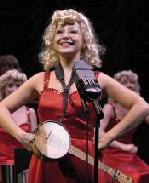SITE GUIDE
SEARCH
REVIEWS
FEATURES
NEWS
Etcetera and
Short Term Listings
LISTINGS
Broadway
Off-Broadway
NYC Restaurants
BOOKS and CDs
OTHER PLACES
Berkshires
London
California
DC
Philadelphia
Elsewhere
QUOTES
On TKTS
PLAYWRIGHTS' ALBUMS
LETTERS TO EDITOR
FILM
LINKS
MISCELLANEOUS
Free Updates
Masthead
Writing for Us
A CurtainUp  London Review
London Review
 London Review
London ReviewBlonde Bombshells of 1943
|
Over here, over paid, over sexed . . . . and rather over rated in that department!
---- Miranda and the girls |

Claire Storey as Lily
(Photo: Ian Tilton ) |
All the actors sing and play their own instruments like the Watermill, Newbury production of Sweeny Todd. The music comes from the great Big Band swing era of talent like Glen Miller, Fats Waller and the Andrews Sisters and is just lovely. It is a small scale production with a big wow factor and I defy anyone to see it and not enjoy it.
The play opens in the present day with Liz talking about her grandmother Elizabeth's time with a band. She sings her grandmother's favourite tune, "If I Had A Ribbon Bow" and the scene cuts to 1943 and a theatre in Yorkshire where four band members are auditioning for four more. They are due to record a radio programme for the BBC that evening from a bombed town somewhere in Yorkshire. The exact location is top secret. Their performance is an important part of the morale raising war effort.
They recruit a schoolgirl, Elizabeth (Karen Paullada), a nun with a ukulele, Lily (Claire Storey), a posh socialite, Miranda (Rosie Jenkins) and Patrick (Chris Grahamson), a male drummer dodging the call up for the army who is prepared to put on a frock. Betty (Elizabeth Marsh) is in charge, in trousers and with plenty of determination and focus. Ruth Alexander Rubin plays May, the sardonic Scottish pianist. Vera (Sarah Groarke) has a husband in a Prisoner of War camp and Grace's (Barbara Hockaday) fiancÚ was killed in the early days of the war.
Plater's writing defines each character skilfully and of course the performances are excellent with plenty of natural repartee comedy. Elizabeth is all wide-eyed innocence, her jaw dropping frequently. Sarah and Grace complement May's witty remarks. Miranda is ghastly, talking in the third person -- it seems she was an army driver but kept crashing the vehicle because in the blackout one couldn't see where one was going. She is openly despised by some of the others because they see her as privileged and spoilt but she sings and plays brilliantly.
The Second Act shows the concert which is being broadcast by the BBC. The girls (and Patrick) are dolled up in blonde wigs and red satin and the sounds they make are fabulous. Libby Watson's sets are authentic, the first with broken rafters from war damage and the second, a real stage with band stands. They play trumpets and sax and clarinet and double bass and trombone and sing to a very high standard. There is a side romance as Patrick homes in on the schoolgirl and the other women do not encourage this. The final act sees a decision on the draft dodger but the main thrust is the wonderful period music which more than makes up for any lack of plot.
|
BLONDE BOMBSHELLS OF 1943
Written by Alan Plater Directed by Mark Babych Starring: Ruth Alexander-Rubin, Karen Paullada, Rosie Jenkins With: Chris Grahamson, Sarah Groarke, Barbara Hockaday, Elizabeth Marsh, Claire Storey Design: Libby Watson Musical Director: Howard Gray Lighting: James Farncombe Sound: Andy Smith Running time: Two hours twenty minutes with one interval Box Office: 020 7722 9301 Booking to 12th August 2006 Reviewed by Lizzie Loveridge based on 20th July 2006 performance at the Hampstead Theatre, Swiss Cottage, London NW3 (Tube: Swiss Cottage) |
|
London Theatre Tickets Lion King Tickets Billy Elliot Tickets Mary Poppins Tickets Mamma Mia Tickets We Will Rock You Tickets Theatre Tickets |




